Noise Pollution is Increasingly Bothersome to City Dwellers: Harm Is Not Just Physical but also Mental
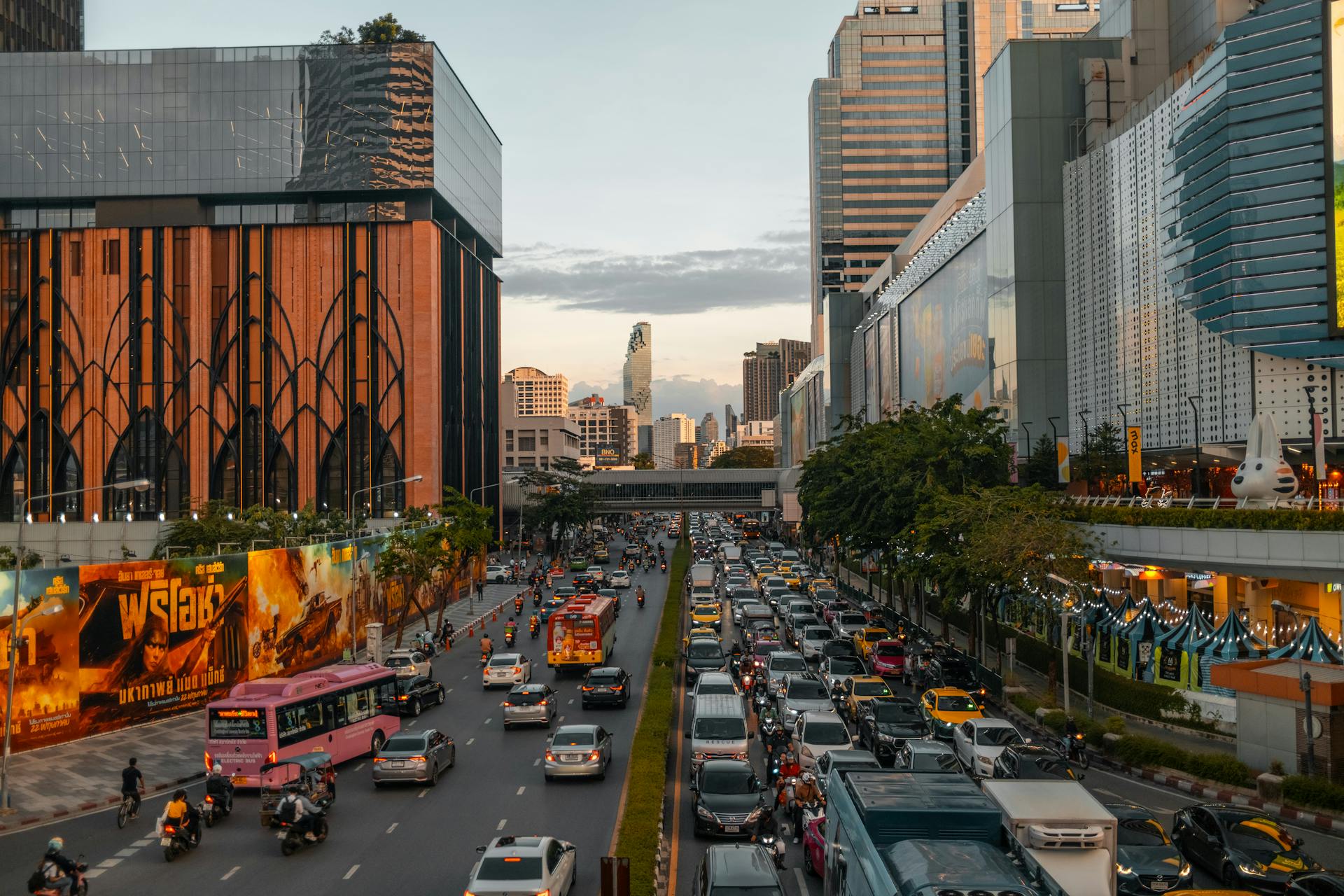
“One of the most distinctive features of Kaunas is its high number of green spaces. They are like islands of oxygen and peace that are particularly appreciated by people who live near the main, high-traffic streets, because these areas serve as a principal refuge from not just the pollution caused by transport but also from the noise. Although people themselves say they are used to the constant buzz of cars, our bodies never adapt to it. We’ve noticed that the pollution caused by noise is increasingly becoming the source of not just physical but also psychological problems”, says the head of the Dept. of Environmental Sciences at Vytautas Magnus University (VMU), Professor Dr. Audrius Dėdelė.
The scientist notes that noise is more than just sound. It is a slowly operating stress which impedes sleep, increases anxiety, and even contributes to the development of cardiovascular diseases.
As a researcher of noise, green zone arrangement, and urban sustainable mobility, the professor emphasises that while urban pollution seems unavoidable, each of us can and must contribute to sustainability. Whether it’s the choice to travel by bicycle instead of by car or simply taking more frequent walks in a park, small decisions like these improve the overall health of the city.
Transport Is the Greatest Threat
An old vehicle population, one whose average age is often over 14 years old, is one of the main sources of pollution in the country, followed by various industrial companies and homeowners who use solid fuels for heating. Still, researchers are most concerned about the pollution caused by noise, which is directly related to transport flows. According to the VMU professor, this includes not just the noise caused by public or private transport but also noise from trains or air traffic.
“As the number of vehicles rises, their noise grows in intensity as well. At the same time, there’s a rise in the pollution level, especially that of nitrogen dioxide, which is often considered to be an indicator of transport intensity. Meanwhile, pollution caused by particulate matter is associated more with older and technically deficient diesel vehicles. We could say that they are to blame for the increased concentration of particulate matter”, Prof. Dėdelė explains the situation.
He also draws attention to the city’s natural terrain. “For instance, due to strong elevation differences in Kaunas, some lower places – valleys – become something like pollution traps. There, the air circulates poorly, therefore, pollutants, especially particulate matter, are retained for longer and do greater harm to the environment and people’s health”, the professor notes.
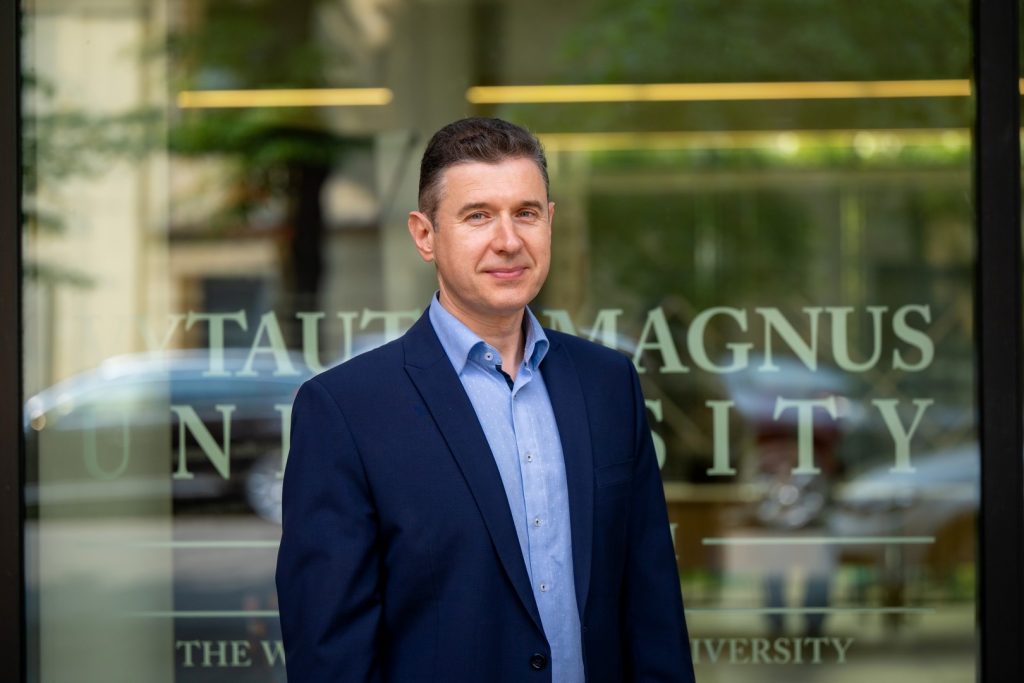
Prof. Dr. Audrius Dėdelė
The scientist claims that the place where an individual resides may be the greatest factor in the measurement of pollution. City residents who live near main streets may experience the effects of air pollution for many years. In such cases, this may have an impact on various health issues.
“When we discuss the impact of air pollution, we must first mention respiratory diseases such as asthma or various allergies. Fine particulate matter, which easily enters the human body through breathing, may, in the long run, even be associated with the development of lung cancer, especially if the individual has spent a long time living in the same polluted environment”, Prof. Dėdelė remarks.
According to the professor, harm is caused not just by what we breathe in: constant noise also has a significant effect on our emotional state. “If someone cannot have a rest at home due to frequent noise, there’s constant irritability and the sleep rhythm is disrupted. All of this leads down a path straight to a decline in both physical and mental health”, VMU expert points out.
The Problem Is Evident Among Youths Too
Martyna Buklytė, student of Environmental Science and Protection at VMU and president of the VMU Academic Youth Science Association “Modusas”, also singles out noise as one of the most pressing issues among young people.
“Since most of us live near busy streets in cities, we are having more and more discussions about how such an environment is affecting us psychologically and how it makes us feel. We have noticed that it causes us to experience more stress. Thus, in order to address this problem, we’ve started organizing nature hikes along educational trails for members of our organization. After one of our most recent hikes, we came to a unanimous conclusion that such activities truly help us relax, reduce levels of stress and anxiety, and ‘escape’ from the effects of urban noise. Therefore, we have to try to spend more time in nature”, Martyna says.
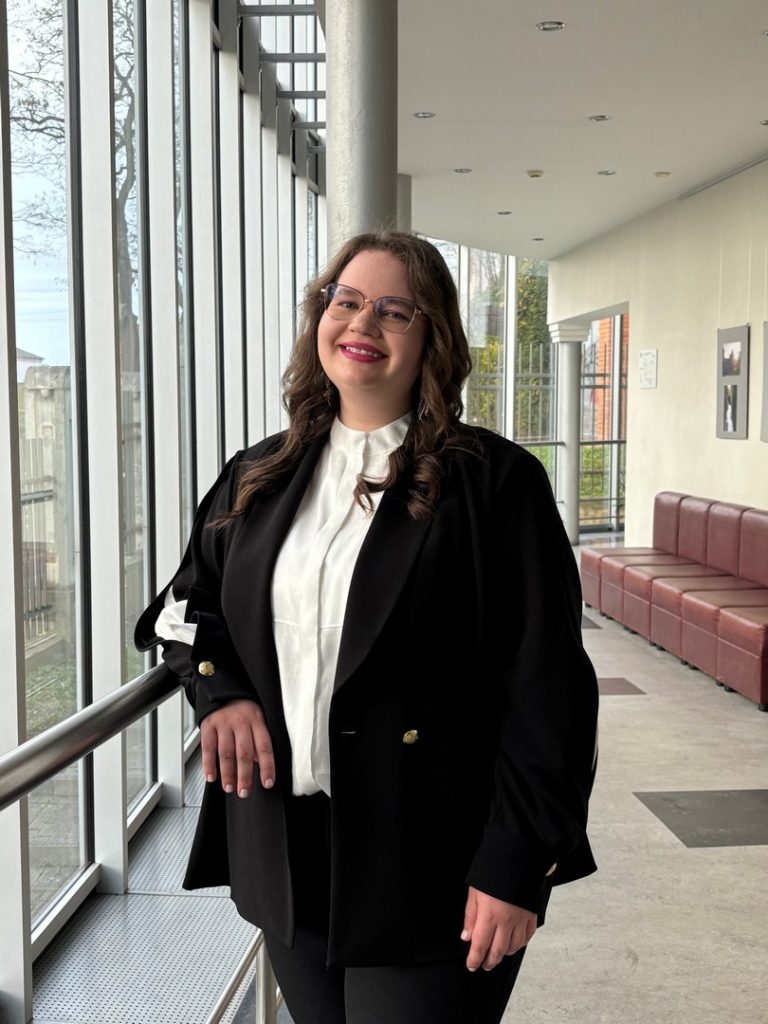
Martyna Buklytė. Photo from personal archive
Prof. Audrius Dėdelė adds that it’s critical for cities to not lose their green spaces: squares and parks must be maintained, because, to most city dwellers, these are the only places where they can relax. “Green spaces should become the mainstay of cities, because they help balance out the noise level that irritates us. Even if we don’t think so, our bodies do feel the waves and vibrations caused by noise”, VMU scientist claims.
Several Important Habits Can Help to Protect Ourselves
Living in the city, one cannot completely avoid pollution. However, Dėdelė emphasises that each of us can contribute to its reduction today.
“First of all, to make a change, we have to start with ourselves: choose a sustainable method of mobility”, the professor explains. In his words, we can cover shorter distances on foot, and, if needed, ride a bike or use public transportation.
“Speaking of Kaunas in particular, even though the city has many drawbacks due to the high concentration of industry and transport, everything here is located within short distances that can be covered without using a polluting vehicle”, Dėdelė states and suggests that following the latest information in the media is a good way to protect oneself from, and perhaps even completely avoid, the effects of pollution.
Although physical activity is frequently associated with a healthy lifestyle, when air pollution is increased, it can do more harm than good. “When we move with higher intensity, we also breathe deeper, which means that a larger amount of pollutants enters our bodies”, the professor warns.
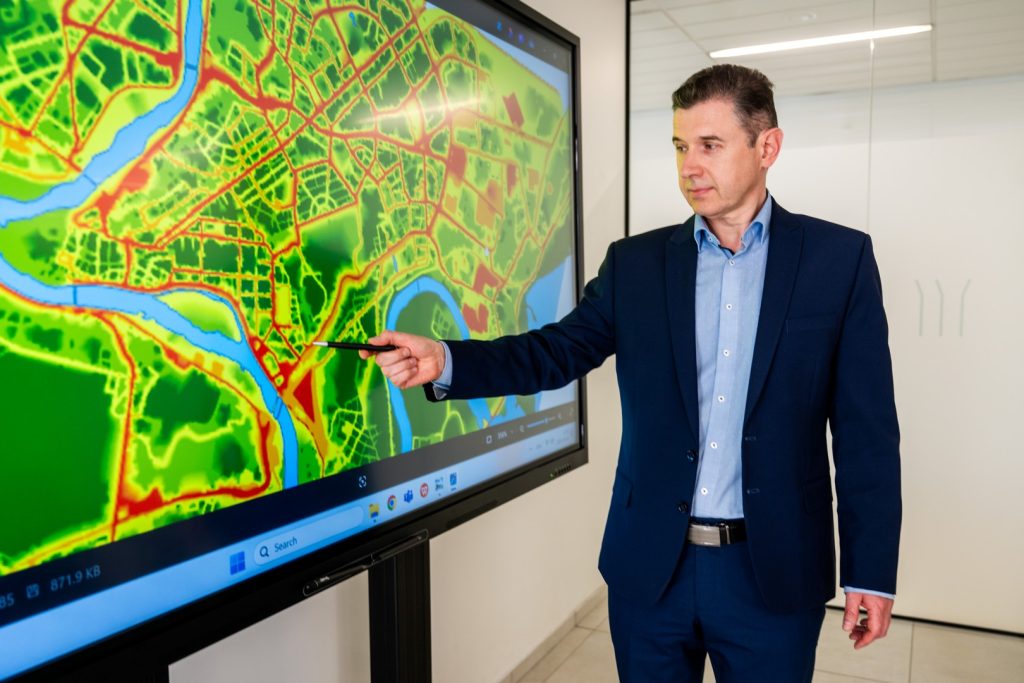
Prof. Dr. Audrius Dėdelė
Together with students, the VMU scientist conducted research analysing air pollution level at different distances from a street’s traffic area: 20, 40, and 60 metres. The results were clear: at just 20 metres away, air pollution is reduced by about 30 percent. This, according to the professor, is a simple but effective way to lower the amount of inhaled pollutants in our daily lives.
“For example, if you’re waiting for the bus and can move at least 20 metres away from the traffic, this will already diminish the dose of pollution you receive. The same applies to walks: avoid routes along main, high-traffic streets”, the expert shares practical advice.
Studies that Develop Critical Thinking
In the words of Martyna, who is studying Environmental Science and Protection, the students are increasingly taking the initiative to care for the environment: this topic has long gone beyond lecture halls and is increasingly tackled in Student Parliament’s discussions.
“Sorting waste has already become a part of many students’ daily lives: not only do most of them sort their trash but they also wash the packaging before recycling it, analyse its composition, and choose environmentally friendly packaging. Although various sorting systems operate within the university, they are lacking in, for example, dormitories. We need to start not only with ourselves but also try to ensure that others get involved in this initiative”, the student shares her perspective.
An interest in environmental policy, chemistry, and geography were the main factors that encouraged her to choose Environmental Science and Protection studies. “I want to solve problems because I believe that solving a problem often becomes a good indicator of growth”, Martyna notes confidently. Her future plans currently involve activities that would help reduce the negative impact of urban development on nature and ecosystems.
She is glad that her study program offers the chance to try out many things in practice. Already in their first year, students participated in an off-site practice with a geology teacher, during which they explored Lithuania’s subsurface. “Through lab work, we examine environmental issues from a small-scale perspective using chromatography methods: how small amounts of particles can pollute air or water. This helps us see how much can be hidden in small things”, the student says with fascination.
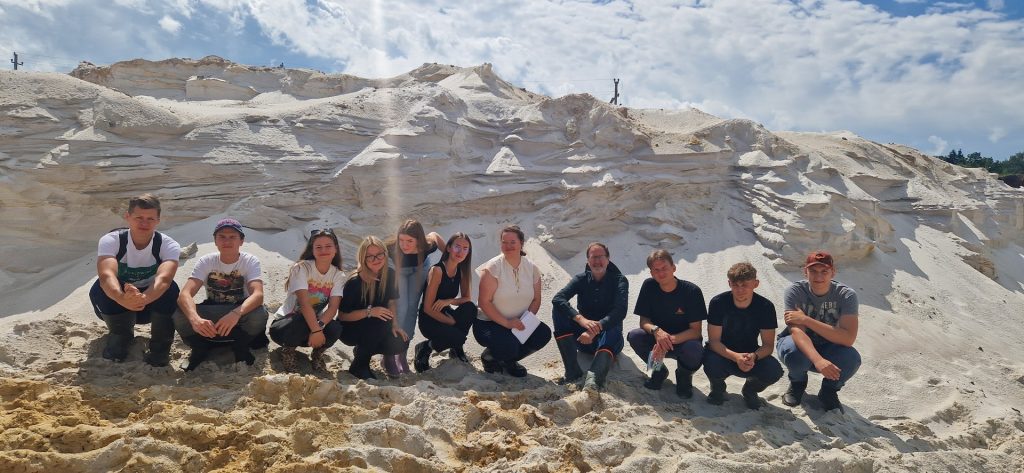
Students of VMU Environmental Science and Protection during geology internship (center: Martyna Buklytė). Photo from personal archive
According to the head of the study program, Audrius Dėdelė, this broad perspective on the environment is precisely what the program is built upon. During their studies, students not only gain knowledge in ecology and chemistry but also explore political and legal issues related to climate change. “Students also do diverse internships, which give them the opportunity not only to closely examine various processes but also to learn how to assess situations better when they encounter a problem. The program teaches not only specialty subject-specific knowledge but, most importantly, develops the critical thinking needed for effective problem-solving”, says the professor from VMU.
Environmental Specialists Are Highly Sought After in the Job Market
The researcher is certain that as long as humans continue to impact the environment through their actions, there will never be too many environmental specialists. “Environmental protection specialists not only oversee but also initiate processes that reduce environmental impact. Our graduates work in the public sector – in various government institutions, municipal environmental departments, environmental consultancy firms – as well as in the private sector, implementing technologies that reduce environmental impact or working with GIS technologies (Geographic Information Systems for spatial or descriptive data processing – Author’s Note). Naturally, we encourage students who have earned a bachelor’s degree to continue developing their competencies in master’s programs and later pursue a scientific career, thus contributing to greater sustainability and the protection of our planet through their research,” says Prof. Dėdelė.
According to the VMU professor, specialists who can work with large data sets are currently in high demand. “Satellites collect data on air pollution, and automated monitoring stations analyse air quality in city centres. All of this produces a complex stream of data, so it’s important to have experts who can process and work with this information. Climate change experts are increasingly important, and in the business sector, there is growing demand for sustainability coordinators. Specialists are needed who can integrate circular economy principles into various fields”, the professor explains, outlining the most promising and in-demand areas today.
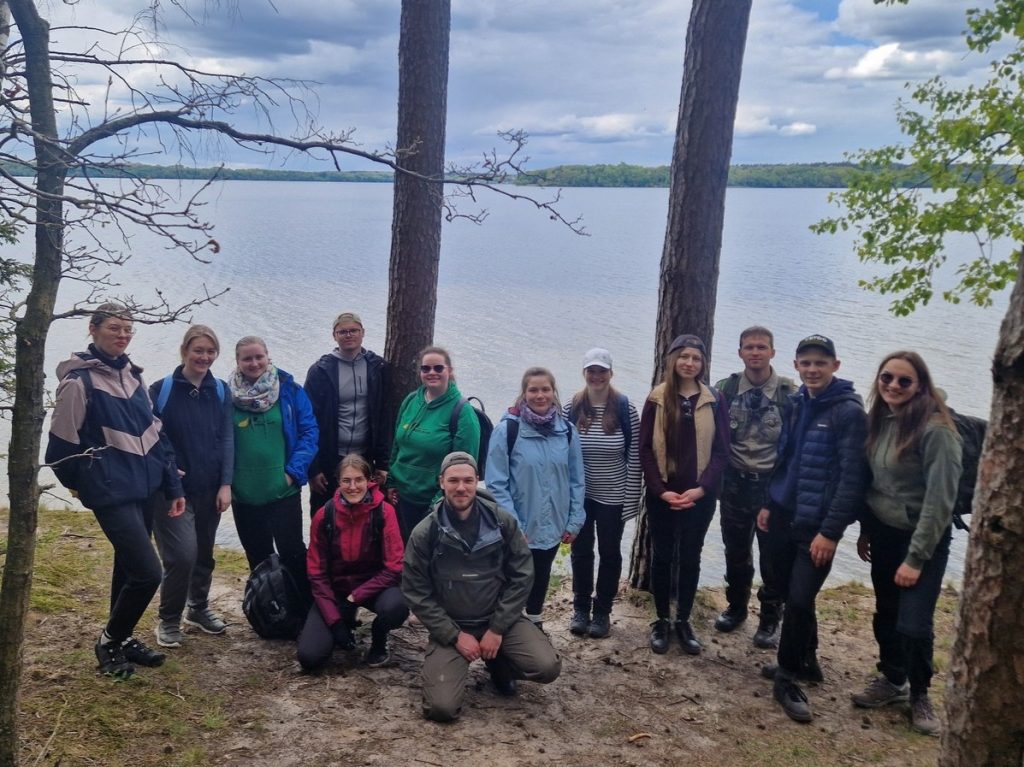
Nature hike with members of VMU AYSA Modusas (Martyna Buklytė is standing fifth from the right). Photo from personal archive
Sustainable Urban Living: A Mission Possible
Second-year Environmental Science and Protection student Martyna says that, together with like-minded peers, she not only discusses local environmental issues and searches for solutions but also isn’t afraid to speak openly about the challenges posed by climate change that future generations will have to address. She notes a particular lack of global problem-solving approaches.
“We will fight global pollution and the consequences of climate change not just in Lithuania but around the world. As the population and transportation grow, so does noise pollution. We will also have to deal with increasing consumerism”, Martyna lists the most pressing issues.
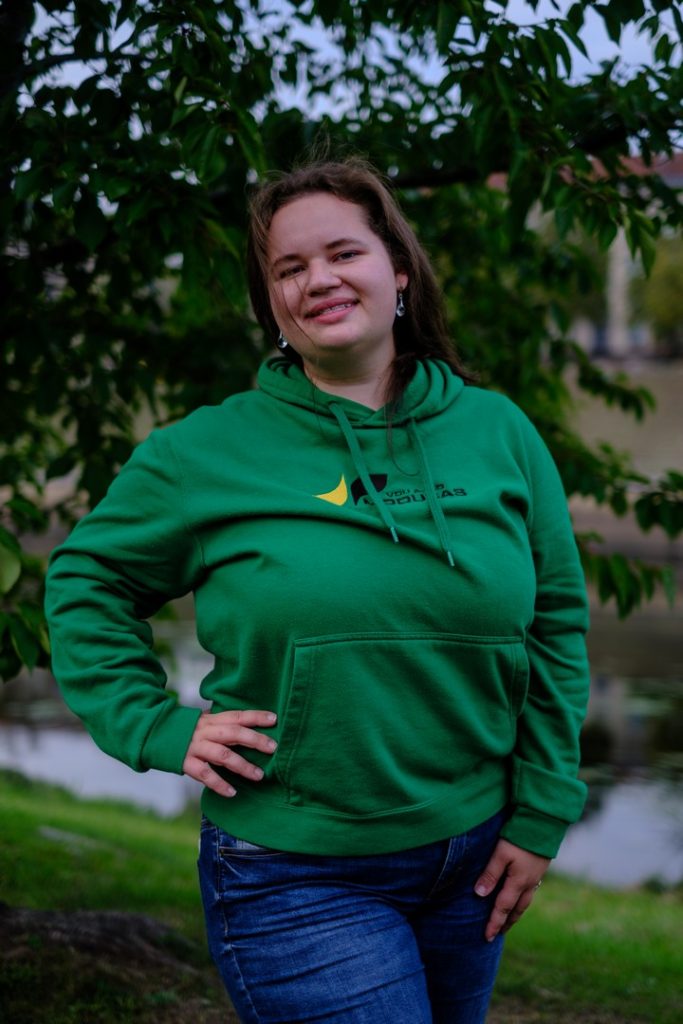
Martyna Buklytė. Photo by Arvydas Čiukšys (Kaunas Pilnas Kultūros)
Prof. Audrius Dėdelė emphasizes that major changes begin with each individual’s daily actions. “The phrase ‘What difference can one person make?’ is wrong. Everyone can contribute with small but important steps”, the scientist believes.
He is pleased that Lithuania is quickly becoming one of the leaders in waste sorting, which not only slows the expansion of landfills but also encourages new sustainable solutions. Food waste sorting is becoming increasingly relevant, as it allows the waste to be later used in biogas production.
Choosing sustainable mobility – walking or cycling – not only reduces stress but also improves physical health. “It’s great to see the bike path network expanding every year and the public transport fleet being updated with hybrid, low-emission buses and better-regulated routes. All of this proves that sustainable city living is not only possible but also achievable in reality”, the professor concludes.












